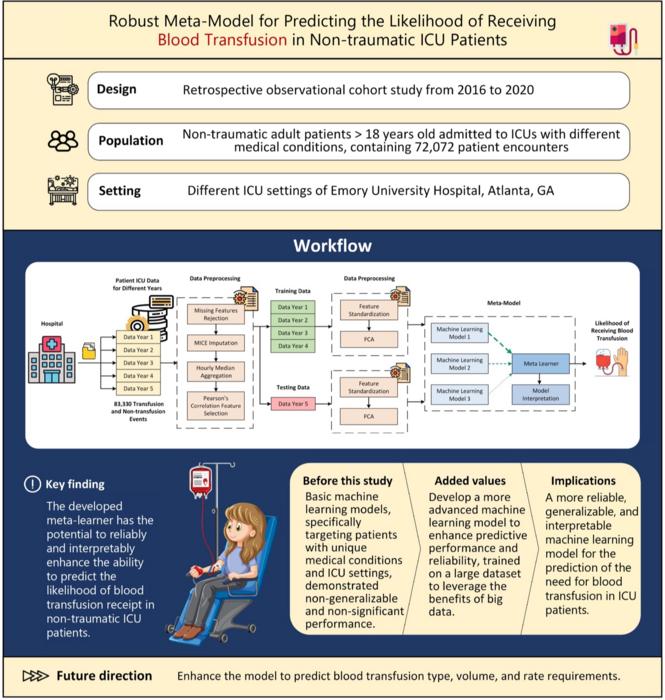Researchers at Emory University have made significant strides in the field of artificial intelligence (AI) with the development of a sophisticated model that can accurately predict blood transfusion needs in non-traumatic intensive care unit (ICU) patients. This breakthrough, published in the peer-reviewed journal Health Data Science, addresses a persistent gap in the ability to foresee transfusion requirements among a heterogeneous patient population presenting diverse medical challenges. The implications of this technology extend far beyond theoretical applications, potentially reshaping patient care methodologies in ICU settings worldwide.
Traditionally, blood transfusions play a crucial role in managing conditions such as anemia and coagulopathy within the ICU. However, existing clinical decision support systems have primarily concentrated on narrow patient subsets or specific transfusion types. This narrow focus often complicates the decision-making process, particularly in high-stakes environments where timely and precise interventions are crucial. The new AI model devised by Emory University’s research team tackles these issues head-on, employing a comprehensive analysis of a myriad of clinical features—ranging from laboratory test results to vital signs. The model can predict transfusion requirements within a critical 24-hour timeframe, thus enabling more efficient clinical responses.
At the forefront of this research initiative is Alireza Rafiei from the Department of Computer Science, in collaboration with Rishikesan Kamaleswaran from the Department of Biomedical Informatics. The development of the AI model was made possible by a vast dataset comprised of over 72,000 ICU patient records collected over five years. By leveraging advanced machine learning techniques and a meta-model ensemble approach, the research team achieved outstanding performance metrics, including an impressive area under the receiver operating characteristic curve (AUROC) score of 0.97. The accuracy rate and F1 score were marked at 0.93 and 0.89, respectively, underscoring the reliability and precision of this predictive model.
A significant aspect of this AI model is not just its ability to predict transfusion needs but also its capacity to identify key biomarkers—such as hemoglobin and platelet levels—that significantly influence transfusion decisions. Rafiei highlighted this feature, stating, “Our model not only accurately predicts the need for a blood transfusion but also identifies critical biomarkers that influence transfusion decisions.” This dual capability positions the model as an invaluable decision-support tool for clinicians, which could lead to improved patient outcomes and optimized resource allocation in ICU settings.
Rigorous evaluations were conducted to ascertain the robustness and reliability of the AI model across multiple real-world scenarios. The results indicated that the model maintains consistent performance across various ICU cohorts and medical conditions. This level of reliability is essential for healthcare systems aiming to integrate such AI technologies into their operations. As the healthcare industry continues to grapple with challenges presented by diverse patient needs, this model offers a promising solution, enhancing the precision of medical interventions in acute settings.
The research team plans to take the next significant step by integrating this AI model into clinical workflows, thus facilitating real-time decision support for healthcare professionals. This future integration is aimed at further validating the model’s effectiveness in practical ICU settings. Rishikesan Kamaleswaran remarked, “Our ultimate goal is to personalize and optimize transfusion strategies, enhancing patient care and operational efficiency in hospitals.” This intention to embed AI-driven tools within everyday clinical practice signifies a transformative shift towards data-driven healthcare solutions.
The advent of this AI model marks a notable step forward in integrating technological advancements into critical care medicine. The use of AI not only enhances clinical decision-making but also highlights the potential for data-driven technologies to revolutionize healthcare delivery methods. As hospitals increasingly seek to implement advanced analytics in their operations, this model serves as a benchmark for future innovations aimed at improving patient care.
The implications of this research extend beyond immediate clinical applications. By demonstrating how AI can magnify the capabilities of existing healthcare systems, there lies a broader potential for improving overall efficacy in healthcare delivery. This study propels the conversation surrounding the intersection of technology and medicine, prompting further exploration into how AI can be employed to overcome other persistent challenges in patient care.
In conclusion, the successful development and validation of this AI model for predicting blood transfusion requirements showcases the transformative potential of technology in medicine. As Emory University continues to explore the frontiers of AI in healthcare, the anticipated integration of this model into clinical practice heralds a new era of patient-centered care. This development promises not only to enhance the accuracy of clinical decision-making but also to instill a more data-oriented approach to acute care methodologies, which could ultimately lead to improved patient outcomes across various healthcare settings.
The journey this research team has embarked upon reflects a growing trend within the scientific community to harness the power of AI in addressing real-world healthcare challenges. The potential this holds for the future of medical practice is immense, paving the way for further advancements and innovations that can elevate patient care standards globally. As we look forward to witnessing these changes, the groundwork laid by this innovative research serves as an exciting precursor to what lies ahead in the continuously evolving landscape of healthcare technology.
Subject of Research: Predicting blood transfusion needs in non-traumatic ICU patients using AI
Article Title: Robust Meta-Model for Predicting the Likelihood of Receiving Blood Transfusion in Non-traumatic Intensive Care Unit Patients
News Publication Date: 6-Nov-2024
Web References: Health Data Science
References: Available upon request.
Image Credits: Credit: Alireza Rafiei, Emory University
Keywords
Artificial Intelligence, Blood Transfusion, Intensive Care Unit, Machine Learning, Healthcare Technology, Clinical Decision Support, Patient Outcomes.





